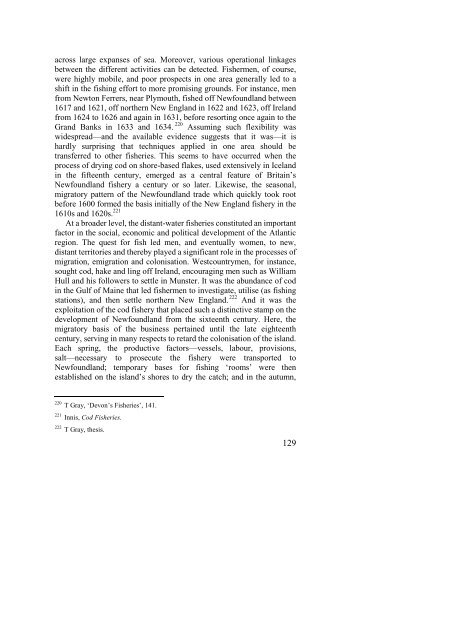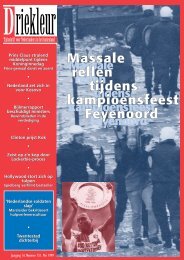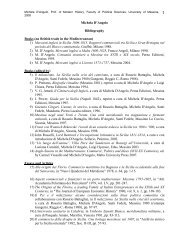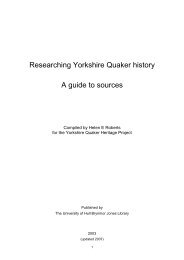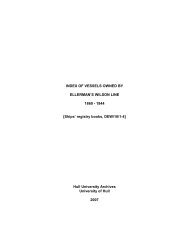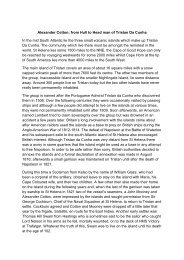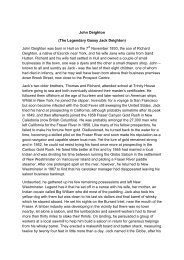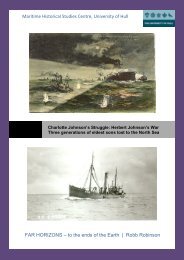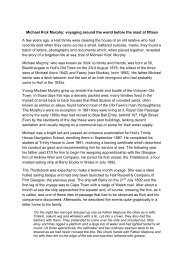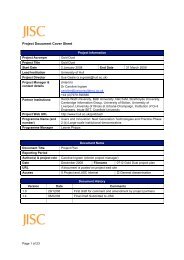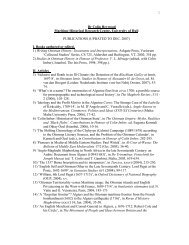The North Atlantic Fisheries, 1100-1976 - University of Hull
The North Atlantic Fisheries, 1100-1976 - University of Hull
The North Atlantic Fisheries, 1100-1976 - University of Hull
Create successful ePaper yourself
Turn your PDF publications into a flip-book with our unique Google optimized e-Paper software.
across large expanses <strong>of</strong> sea. Moreover, various operational linkages<br />
between the different activities can be detected. Fishermen, <strong>of</strong> course,<br />
were highly mobile, and poor prospects in one area generally led to a<br />
shift in the fishing effort to more promising grounds. For instance, men<br />
from Newton Ferrers, near Plymouth, fished <strong>of</strong>f Newfoundland between<br />
1617 and 1621, <strong>of</strong>f northern New England in 1622 and 1623, <strong>of</strong>f Ireland<br />
from 1624 to 1626 and again in 1631, before resorting once again to the<br />
Grand Banks in 1633 and 1634. 220 Assuming such flexibility was<br />
widespread—and the available evidence suggests that it was—it is<br />
hardly surprising that techniques applied in one area should be<br />
transferred to other fisheries. This seems to have occurred when the<br />
process <strong>of</strong> drying cod on shore-based flakes, used extensively in Iceland<br />
in the fifteenth century, emerged as a central feature <strong>of</strong> Britain’s<br />
Newfoundland fishery a century or so later. Likewise, the seasonal,<br />
migratory pattern <strong>of</strong> the Newfoundland trade which quickly took root<br />
before 1600 formed the basis initially <strong>of</strong> the New England fishery in the<br />
1610s and 1620s. 221<br />
At a broader level, the distant-water fisheries constituted an important<br />
factor in the social, economic and political development <strong>of</strong> the <strong>Atlantic</strong><br />
region. <strong>The</strong> quest for fish led men, and eventually women, to new,<br />
distant territories and thereby played a significant role in the processes <strong>of</strong><br />
migration, emigration and colonisation. Westcountrymen, for instance,<br />
sought cod, hake and ling <strong>of</strong>f Ireland, encouraging men such as William<br />
<strong>Hull</strong> and his followers to settle in Munster. It was the abundance <strong>of</strong> cod<br />
in the Gulf <strong>of</strong> Maine that led fishermen to investigate, utilise (as fishing<br />
stations), and then settle northern New England. 222 And it was the<br />
exploitation <strong>of</strong> the cod fishery that placed such a distinctive stamp on the<br />
development <strong>of</strong> Newfoundland from the sixteenth century. Here, the<br />
migratory basis <strong>of</strong> the business pertained until the late eighteenth<br />
century, serving in many respects to retard the colonisation <strong>of</strong> the island.<br />
Each spring, the productive factors—vessels, labour, provisions,<br />
salt—necessary to prosecute the fishery were transported to<br />
Newfoundland; temporary bases for fishing ‘rooms’ were then<br />
established on the island’s shores to dry the catch; and in the autumn,<br />
220 T Gray, ‘Devon’s <strong>Fisheries</strong>’, 141.<br />
221 Innis, Cod <strong>Fisheries</strong>.<br />
222 T Gray, thesis.<br />
129


